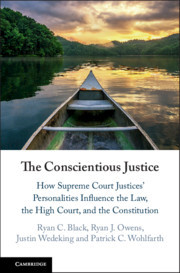Description
The Conscientious Justice
How Supreme Court Justices' Personalities Influence the Law, the High Court, and the Constitution
Authors: Black Ryan C., Owens Ryan J., Wedeking Justin, Wohlfarth Patrick C.
Reveals how Supreme Court justices' personalities, particularly conscientiousness, influence the Law, the High Court, and the Constitution.
Language: English
Subject for The Conscientious Justice:
Approximative price 38.06 €
In Print (Delivery period: 14 days).
Add to cart
The Conscientious Justice
Publication date: 09-2021
Support: Print on demand
Publication date: 09-2021
Support: Print on demand
Approximative price 120.25 €
In Print (Delivery period: 14 days).
Add to cart
The Conscientious Justice
Publication date: 11-2019
350 p. · 15.6x23.5 cm · Hardback
Publication date: 11-2019
350 p. · 15.6x23.5 cm · Hardback
Description
/li>Contents
/li>Biography
/li>
United States Supreme Court justices make decisions that have a profound impact on American society. Empirical legal scholars have portrayed justices as either single-minded or strategic seekers of policy, and there is little room in these theories for things like law, reputation, or personality. This book offers a fresh perspective that will jar Supreme Court scholarship out of complacency. It argues that justices' personalities influence their behavior, which in turn influences legal development and the United States Constitution. This impressive group of authors exhaustively examine every part of the Court's decision-making process, and focus on the trait of conscientiousness and how it influences justices over nine different empirical contexts, from agenda setting to writing the Court's opinions. The Conscientious Justice is an important and comprehensive account of judging that restructures existing approaches to analyzing the High Court.
1. Introduction; 2. A theory about justices and conscientiousness; 3. Measuring justices' conscientiousness; 4. Conscientiousness and Supreme Court agenda setting; 5. Conscientiousness and legal persuasion; 6. Conscientiousness and the United States Solicitor General; 7. Conscientiousness and majority opinion assignments; 8. Conscientiousness and opinion bargaining; 9. Conscientiousness and Supreme Court Opinion Content; 10. Conscientiousness and the treatment of precedent; 11. Conscientiousness and public opinion; 12. Conscientiousness and recusal; 13. Conclusion.
Ryan C. Black is Professor of Political Science at Michigan State University and a faculty affiliate with the Michigan State University College of Law. He has published three books and over fifty articles or chapters in a variety of peer-reviewed political science journals, peer-reviewed interdisciplinary journals, and law reviews.
Ryan J. Owens is Professor of Political Science at the University of Wisconsin, Madison, Director of the Tommy G. Thompson Center on Public Leadership, and a faculty affiliate at the University of Wisconsin School of Law. His work analyzes the United States Supreme Court, the United States Courts of Appeals, legal institutions, and judicial behavior.
Justin Wedeking is Professor of Political Science at the University of Kentucky. He has co-authored three previous books and many articles in a variety of peer-reviewed journals and academic outlets. His work primarily analyzes the United States Supreme Court.
Patrick C. Wohlfarth is Associate Professor in the Department of Government and Politics at the University of Maryland, College Park. His previous research has been published by Cambridge and various peer-reviewed journals. His work focuses on judicial behavior and legal institutions in the United States, including executive branch litigation, the impact of public opinion, and opinion writing.
Ryan J. Owens is Professor of Political Science at the University of Wisconsin, Madison, Director of the Tommy G. Thompson Center on Public Leadership, and a faculty affiliate at the University of Wisconsin School of Law. His work analyzes the United States Supreme Court, the United States Courts of Appeals, legal institutions, and judicial behavior.
Justin Wedeking is Professor of Political Science at the University of Kentucky. He has co-authored three previous books and many articles in a variety of peer-reviewed journals and academic outlets. His work primarily analyzes the United States Supreme Court.
Patrick C. Wohlfarth is Associate Professor in the Department of Government and Politics at the University of Maryland, College Park. His previous research has been published by Cambridge and various peer-reviewed journals. His work focuses on judicial behavior and legal institutions in the United States, including executive branch litigation, the impact of public opinion, and opinion writing.
© 2024 LAVOISIER S.A.S.




